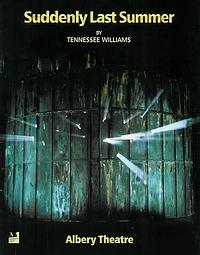Suddenly Last Summer Review 2004
Tennessee Williams described his writing of 'Suddenly Last Summer', as a 'catharsis, a final fling with violence' and no doubt it allowed Williams to wrestle with some of the ghosts that haunted him; his homosexuality; the growing guilt in not opposing his mother's decision to have a prefrontal lobotomy performed on his sister Rose; and his struggle with alcoholism.
Williams was obsessed with the view that we swim in a sea of intense passions over which we have little control. In Williams' plays love is always an impetuous beast, just as liable to destroy as to create, "We all devour each other, in our fashion" he once said in an interview.
Diana Rigg plays an imperious Mrs Venable. Silvery haired and draped in sombre mauve dress she looks every inch an ageing southern belle, only this southern belle's grief and bitterness has stripped away her grace and charm. Like the Venus flytrap, that was once so lovingly cared for by her son, she is eager to ensnare her distraught niece. Mrs Venable casts a chilling figure as she speaks chimerically of her love for Sebastian, the depth of her delusion shows when she says of their relationship "we carved out each day of our lives like a piece of sculpture." You quickly realise there will be little mercy for her niece if she threatens to tarnish these precious memories.
Diana Rigg is superb in her portrayal of strong, domineering women but is not so apt at showing emotional anguish and distress. As the play progresses and Mrs Venable is forced to confront the truth about Sebastian her imperiousness does not crumble as her illusions are shattered and she loses her son for a second time. My other complaint is her voice; in trying to sound like an ageing, southern belle her voice is at times very rasp and I could not always make out her words.
Victoria Hamilton gives a powerful performance as Catherine. Her excitable manner, fixed glare and taut posture suggest a woman haunted by terrible memories. When she grasps Dr Cukrowicz (Mark Bazeley) to seek comfort and affection one can feel the terrible loneliness that is devouring her.
In the play Mrs Venable describes the giant turtles that heave their bodies on to dry land to lay their eggs in the sand. When the eggs hatch, birds of prey swoop down on the unfortunate baby turtles as they try to reach the safety of the ocean. This analogy is one that Tennessee Williams applies to life; we search for happiness and wholeness, but passions of jealousy, revenge etc, can so easily sweep down on us like birds of prey devouring our flesh.
We are meant to be able to relate to both Mrs Venable and Catherine; they should encapsulate our own struggles with those baser parts of ourselves that can so easily destroy our relationships. However, in this production the analogy seems more fittingly applied to Mrs Venable, a malicious bird of prey about to swoop down and devour the helpless Catherine.
What other critics had to say.....
NICHOLAS DE JONGH for THE EVENING STANDARD says, "An evening of vintage horror." MICHAEL BILLINGTON for THE GUARDIAN says, "A production that establishes the play's mood visually and aurally." IAN JOHNS for THE TIMES says, "Triumph of Grandage's revival and its two lead performances." RACHEL HALLIBURTON for TIME OUT says, "Blazungly impressive production."
External links to full reviews from popular press
The Guardian
The Times
Originally published on
